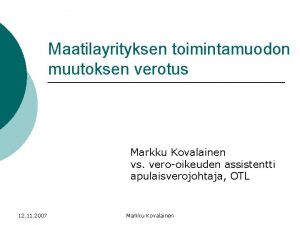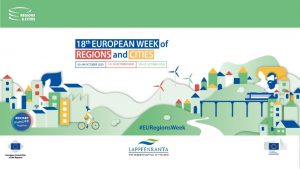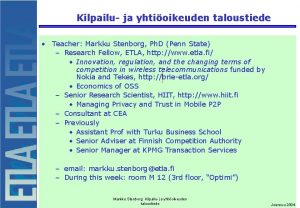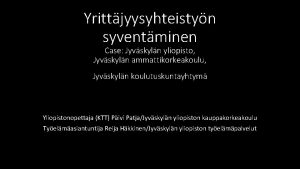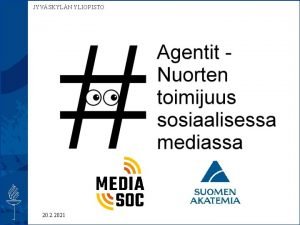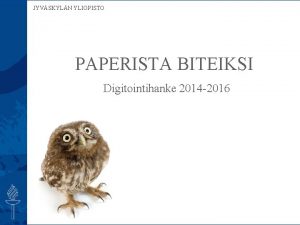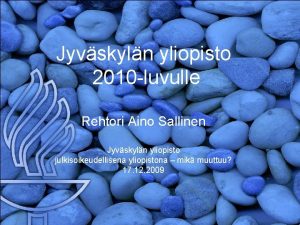Ekologisen teorian jalanjljill Markku Leskinen Jyvskyln yliopisto Kasvatustieteiden








- Slides: 8

“Ekologisen teorian jalanjäljillä” Markku Leskinen Jyväskylän yliopisto Kasvatustieteiden laitos / erityispedagogiikka

“… many of these experiments involve situations that are unfamiliar, artificial, and short-lived, and call for unusual behaviors that are difficult to generalize to other settings. … much of developmental psychology, as it now exists, is the science of the strange behavior of children in strange situations with strange adults for the briefest possible periods of time. ” Bronfenbrenner (1979, 18 -19)

Ecocultural theory: beyond “circles” “However, the very comprehensiveness of Bronfrenbrenner’s (1979) and similar approaches has created a formidable challenge: If everything is plausibly connected to everything else, how should the different levels or units of analysis be organized? There is no criterion for choosing variables or features to include and exclude at each ecological “circle” and no principled basis for ordering ecological features in terms of their hypothesized relative effects on childcare and children”. (s. 217) Gallimore, Weisner, Kaufman, & Bernheimer (1989). The social construction of ecocultural niches: Family accommodation of developmentally delayed children. American Journal on Mental Retardation, 94(3), 216 -230.

Ecocultural theory: focus on everyday routine “… the ecocultural niche – manifested in the everyday routine and its constituent activity settings – is not static: it is changing at two levels. First, the socioeconomic constraints and resources of the niche have evolved and continue to evolve through a broadly cultural-historical process beyond the control of individual households. Second, at the household level the niche is also changing and being shaped as a result family accommodation”. (s. 218) Gallimore, Weisner, Kaufman, & Bernheimer (1989). The social construction of ecocultural niches: Family accommodation of developmentally delayed children. American Journal on Mental Retardation, 94(3), 216 -230.

The Ecocultural Family Interview • Thomas S. Weisner, Jennifer J. Coots, Lucinda Bernheimer, & Angela Arzubiaga • UCLA 1993, CHILD-project • “Children’s participation in the repeated routines a culture provides for everyday life is probably the single most important influence, though not the only one influence, in a child development. ” • “The notion of ‘constructing’ a routine reminds us that family life is an ACTIVE process. Families shape and are shaped by the social world around them. Ecocultural theory treats families as active planners and conscious agents shaping their worlds, not as hapless victims of implacable social and economic forces. ” • “For a family to construct a sustainable daily routine they must manage their perceived constraints and opportunities. ”

10 EFI domains / children with developmental delays in Los Angeles • 1. 2. 3. 4. 5. 6. (Weisner (1984) 12 theoretical dimensions) Subsistence: The resicilience of the family’s subsistence base Services: The use of social services by the family Home: The structuring of home environment. Domestic workload: The amount of childcare and domestic work Connectedness: The connectedness of the family Nondisabled networks: The involvement of the child in nondisabled networks 7. Disability networks: The involvement of the child in disabled networks 8. Diversity: The diversity of family’s cultural influences 9. Support: The variety and amount of assistance 10. Information: The use of information from professionals.

EFI coding • • Low: 0, 1 or 2 Moderate: 3, 4, 5 High: 6, 7, 8 9: Not applicaple

Theory base • Psychocultural model: Whiting & Whiting (1975) • Behavior settings: Whiting (1980) • Developmental niche: Super & Harkness (1980, 1986) • Ecocultural niche: Weisner (1984) • Zone of proximal development: Vygotsky (1978) – Rogoff (1990) – Tharp & Gallimore (1988) – Wertsch (1985)



